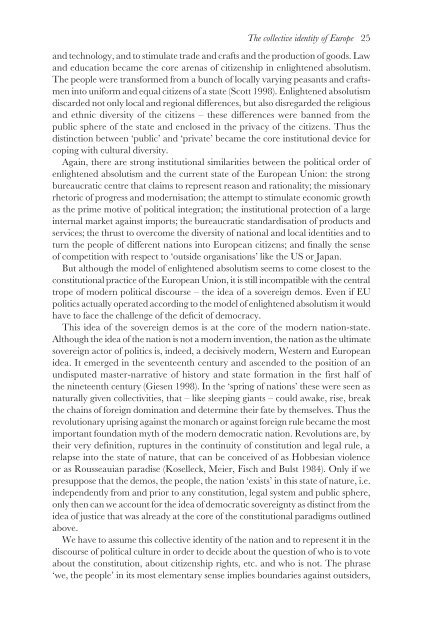Europeanisation, National Identities and Migration ... - europeanization
Europeanisation, National Identities and Migration ... - europeanization
Europeanisation, National Identities and Migration ... - europeanization
Create successful ePaper yourself
Turn your PDF publications into a flip-book with our unique Google optimized e-Paper software.
The collective identity of Europe 25<br />
<strong>and</strong> technology, <strong>and</strong> to stimulate trade <strong>and</strong> crafts <strong>and</strong> the production of goods. Law<br />
<strong>and</strong> education became the core arenas of citizenship in enlightened absolutism.<br />
The people were transformed from a bunch of locally varying peasants <strong>and</strong> craftsmen<br />
into uniform <strong>and</strong> equal citizens of a state (Scott 1998). Enlightened absolutism<br />
discarded not only local <strong>and</strong> regional differences, but also disregarded the religious<br />
<strong>and</strong> ethnic diversity of the citizens – these differences were banned from the<br />
public sphere of the state <strong>and</strong> enclosed in the privacy of the citizens. Thus the<br />
distinction between ‘public’ <strong>and</strong> ‘private’ became the core institutional device for<br />
coping with cultural diversity.<br />
Again, there are strong institutional similarities between the political order of<br />
enlightened absolutism <strong>and</strong> the current state of the European Union: the strong<br />
bureaucratic centre that claims to represent reason <strong>and</strong> rationality; the missionary<br />
rhetoric of progress <strong>and</strong> modernisation; the attempt to stimulate economic growth<br />
as the prime motive of political integration; the institutional protection of a large<br />
internal market against imports; the bureaucratic st<strong>and</strong>ardisation of products <strong>and</strong><br />
services; the thrust to overcome the diversity of national <strong>and</strong> local identities <strong>and</strong> to<br />
turn the people of different nations into European citizens; <strong>and</strong> finally the sense<br />
of competition with respect to ‘outside organisations’ like the US or Japan.<br />
But although the model of enlightened absolutism seems to come closest to the<br />
constitutional practice of the European Union, it is still incompatible with the central<br />
trope of modern political discourse – the idea of a sovereign demos. Even if EU<br />
politics actually operated according to the model of enlightened absolutism it would<br />
have to face the challenge of the deficit of democracy.<br />
This idea of the sovereign demos is at the core of the modern nation-state.<br />
Although the idea of the nation is not a modern invention, the nation as the ultimate<br />
sovereign actor of politics is, indeed, a decisively modern, Western <strong>and</strong> European<br />
idea. It emerged in the seventeenth century <strong>and</strong> ascended to the position of an<br />
undisputed master-narrative of history <strong>and</strong> state formation in the first half of<br />
the nineteenth century (Giesen 1998). In the ‘spring of nations’ these were seen as<br />
naturally given collectivities, that – like sleeping giants – could awake, rise, break<br />
the chains of foreign domination <strong>and</strong> determine their fate by themselves. Thus the<br />
revolutionary uprising against the monarch or against foreign rule became the most<br />
important foundation myth of the modern democratic nation. Revolutions are, by<br />
their very definition, ruptures in the continuity of constitution <strong>and</strong> legal rule, a<br />
relapse into the state of nature, that can be conceived of as Hobbesian violence<br />
or as Rousseauian paradise (Koselleck, Meier, Fisch <strong>and</strong> Bulst 1984). Only if we<br />
presuppose that the demos, the people, the nation ‘exists’ in this state of nature, i.e.<br />
independently from <strong>and</strong> prior to any constitution, legal system <strong>and</strong> public sphere,<br />
only then can we account for the idea of democratic sovereignty as distinct from the<br />
idea of justice that was already at the core of the constitutional paradigms outlined<br />
above.<br />
We have to assume this collective identity of the nation <strong>and</strong> to represent it in the<br />
discourse of political culture in order to decide about the question of who is to vote<br />
about the constitution, about citizenship rights, etc. <strong>and</strong> who is not. The phrase<br />
‘we, the people’ in its most elementary sense implies boundaries against outsiders,



